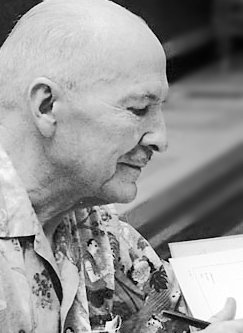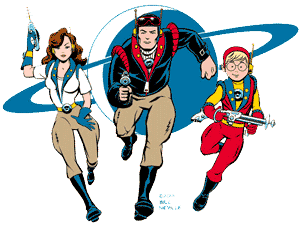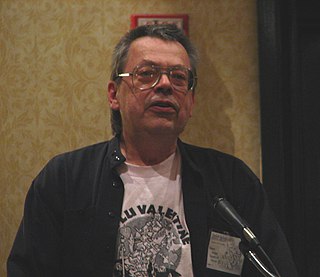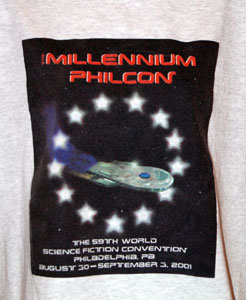First Fandom is an informal association of early, active and well-known science fiction fans.

Robert Anson Heinlein was an American science fiction author, aeronautical engineer, and naval officer. Sometimes called the "dean of science fiction writers", he was among the first to emphasize scientific accuracy in his fiction, and was thus a pioneer of the subgenre of hard science fiction. His published works, both fiction and non-fiction, express admiration for competence and emphasize the value of critical thinking. His plots often posed provocative situations which challenged conventional social mores. His work continues to have an influence on the science-fiction genre, and on modern culture more generally.
Alexei Panshin was an American writer and science fiction critic. He wrote several critical works and several novels, including the 1968 Nebula Award–winning novel Rite of Passage and, with his wife Cory Panshin, the 1990 Hugo Award–winning study of science fiction The World Beyond the Hill.

The 62nd World Science Fiction Convention (Worldcon), also known as Noreascon 4, was held on 2–6 September 2004 at the Hynes Convention Center, Sheraton Boston Hotel and Boston Marriott Copley Place in Boston, Massachusetts, United States.

Stephen Willis Stiles was an American cartoonist and writer, coming out of the science fiction fanzine tradition. He won the 2016 Hugo Award for Best Fan Artist.
The 19th World Science Fiction Convention (Worldcon), also known as Seacon, was held on 2–4 September 1961 at the Hyatt House Hotel in Seattle, Washington, United States.
The 66th World Science Fiction Convention (Worldcon), also known as Denvention 3, was held on 6–10 August 2008 at the Colorado Convention Center and the Sheraton Denver Downtown Hotel in Denver, Colorado, United States.
Francis Marion Busby was an American science fiction writer and science fiction fan. In 1960 he was a co-winner of the Hugo Award for Best Fanzine.

The 59th World Science Fiction Convention (Worldcon), also known as The Millennium Philcon, was held on 30 August–3 September 2001 at the Pennsylvania Convention Center and Philadelphia Marriott Hotel in Philadelphia, Pennsylvania, United States.

The 9th World Science Fiction Convention (Worldcon), also known as Nolacon I, was held 1–3 September 1951 at the St. Charles Hotel in New Orleans, Louisiana, United States.

The 14th World Science Fiction Convention (Worldcon), also known as NyCon II or NEWYORCON, was held on 31 August–3 September 1956 at the Biltmore Hotel in New York City, United States.
The 18th World Science Fiction Convention (Worldcon), also known as Pittcon, was held on 3–5 September 1960 at the Penn-Sheraton Hotel in Pittsburgh, Pennsylvania, United States.
The 20th World Science Fiction Convention (Worldcon), also known unofficially as Chicon III, was held on 31 August–3 September 1962 at the Pick-Congress Hotel in Chicago, Illinois, United States.
The 25th World Science Fiction Convention (Worldcon), also known as NyCon 3 or Nycon 3, was held on 31 August–4 September 1967 at the Statler Hilton Hotel in New York City, United States.
The 42nd World Science Fiction Convention (Worldcon), also known as L.A.con II, was held on 30 August–3 September 1984 at the Anaheim Hilton and the Anaheim Convention Center in Anaheim, California, United States.
Trap Door is a science-fiction fanzine published by Robert Lichtman, with the first issue appearing in October 1983.

Cheryl Morgan is a British science fiction critic and publisher. She has won Hugo Awards for her work on the fanzine Emerald City from 1995 to 2006, and as non-fiction editor of Clarkesworld magazine from 2009 to 2011. Morgan was the first openly trans person to win a Hugo Award, and she is currently the editor of the science fiction magazine Salon Futura.

Futuria Fantasia was an American science fiction fanzine created by Ray Bradbury in 1938, when he was 18 years old. Though only four issues of the fanzine were published, its list of contributors included Hannes Bok, Forrest J. Ackerman, Henry Kuttner, Damon Knight, and Robert A. Heinlein.
Myrtle Rebecca Smith Gray Nolan, known to science fiction history as Morojo or sometimes Myrtle R Douglas, was a science fiction fan, fanzine publisher, and cosplay pioneer from Los Angeles.

An Informal History of the Hugos is a 2018 reference work on science fiction and fantasy written by Jo Walton. In it, she asks if the nominees for the Hugo Award for Best Novel were indeed the best five books of the year, using as reference shortlists from other awards in the genre. After looking at the first 48 years of the award and presenting essays on select nominees, Walton concludes that the Hugo has a 69% success rate. The book was well-received and was itself nominated for a Hugo Award in 2019.